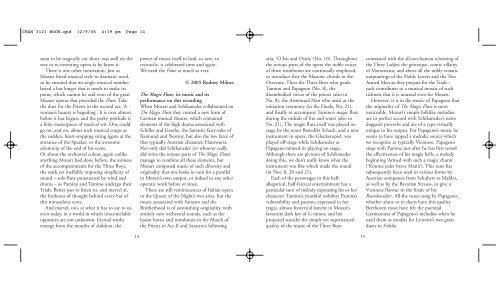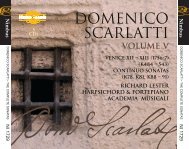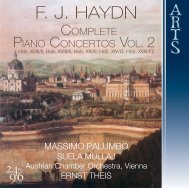Christopher Purves bass - Chandos
Christopher Purves bass - Chandos
Christopher Purves bass - Chandos
Create successful ePaper yourself
Turn your PDF publications into a flip-book with our unique Google optimized e-Paper software.
CHAN 3121 BOOK.qxd 12/9/06 4:19 pm Page 14<br />
soon to be tragically cut short, was well on the<br />
way to re-inventing opera as he knew it.<br />
There is one other innovation. Just as<br />
Mozart fitted musical style to dramatic need,<br />
so he ensured that no single musical number<br />
lasted a bar longer that it needs to make its<br />
point, which cannot be said even of the great<br />
Mozart operas that preceded the Flute. Take<br />
the duet for the Priests in the second act, ‘A<br />
woman’s beauty is beguiling’. It is over almost<br />
before it has begun, and the perky postlude is<br />
a little masterpiece of musical wit. One could<br />
go on, and on, about such musical coups as<br />
the sudden, heart-stopping string legato at the<br />
entrance of the Speaker, or the awesome<br />
solemnity of the end of his scene.<br />
Or about the orchestral colour, again unlike<br />
anything Mozart had done before, the airiness<br />
of the accompaniments for the Three Boys,<br />
the stark yet ineffably imposing simplicity of<br />
sound – solo flute punctuated by wind and<br />
drums – as Pamina and Tamino undergo their<br />
Trials. Better just to listen to, and marvel at,<br />
the freshness of thought behind every bar of<br />
this miraculous score.<br />
And marvel, too, at what it has to say to us,<br />
even today, in a world in which irreconcilable<br />
opposites are not unknown. Eternal truths<br />
emerge from the mouths of children, the<br />
power of music itself to heal, to save, to<br />
reconcile, is celebrated time and again.<br />
We need the Flute as much as ever.<br />
© 2005 Rodney Milnes<br />
The Magic Flute, its music and its<br />
performance on this recording<br />
When Mozart and Schikaneder collaborated on<br />
The Magic Flute they created a new form of<br />
German musical theatre, which contained<br />
elements of the high drama associated with<br />
Schiller and Goethe, the fantastic fairy-tales of<br />
Raimund and Nestroy, but also the low farce of<br />
that typically Austrian character, Hanswurst.<br />
Not only did Schikaneder (or whoever really<br />
did write the serious parts of The Magic Flute)<br />
manage to combine all these elements, but<br />
Mozart composed music of such diversity and<br />
originality that one looks in vain for a parallel<br />
in Mozart’s own output, or indeed in any other<br />
operatic work before or since.<br />
There are still reminiscences of Italian opera<br />
in the Queen of the Night’s two arias, but the<br />
music associated with Sarastro and the<br />
Brotherhood is of astonishing originality, with<br />
entirely new orchestral sounds, such as the<br />
<strong>bass</strong>et horns and trombones in the March of<br />
the Priests in Act II and Sarastro’s following<br />
aria, ‘O Isis and Osiris’ (No. 10). Throughout<br />
the serious parts of the opera the noble voices<br />
of three trombones are continually employed,<br />
to introduce first the Masonic chords in the<br />
Overture. Then the Three Boys who guide<br />
Tamino and Papageno (No. 8), the<br />
disembodied voices of the priests (also in<br />
No. 8), the Armoured Men who assist at the<br />
initiation ceremony (in the Finale, No. 21),<br />
and finally to accompany Tamino’s magic flute<br />
during the ordeals of fire and water (also in<br />
No. 21). The magic flute itself was played on<br />
stage by the tenor Benedikt Schack, and a new<br />
instrument in opera, the Glockenspiel, was<br />
played off-stage while Schikaneder as<br />
Papageno mimed its playing on stage.<br />
Although there are pictures of Schikaneder<br />
doing this, we don’t really know what the<br />
instrument was like which made the sound<br />
(in Nos. 8, 20 and 21),<br />
Each of the personages in this halfallegorical,<br />
half-farcical entertainment has a<br />
particular turn of melody expressing his or her<br />
character: Tamino’s youthful nobility; Pamina’s<br />
vulnerability and passion, expressed in her<br />
tragic, almost hysterical lament in Mozart’s<br />
favourite dark key of G minor, and her<br />
projected suicide; the simple yet supernatural<br />
quality of the music of the Three Boys<br />
14 15<br />
contrasted with the all-too-human scheming of<br />
the Three Ladies; the grotesque, comic villainy<br />
of Monostatos, and above all the nobly ecstatic<br />
outpourings of the Noble Lovers and the Two<br />
Armed Men as they prepare for the Trials –<br />
each contributes to a musical mosaic of such<br />
richness that it is unusual even for Mozart.<br />
However, it is in the music of Papageno that<br />
the originality of The Magic Flute is most<br />
noticeable. Mozart’s simple folklike melodies<br />
are in perfect accord with Schikaneder’s naive<br />
doggerel proverbs and are of a type virtually<br />
unique in his output. For Papageno’s music he<br />
seems to have tapped a melodic source which<br />
we recognize as typically Viennese. Papageno<br />
sings with Pamina just after he has first tested<br />
the effectiveness of his magic bells, a melody<br />
beginning ‘Armed with such a magic charm’<br />
(‘Könnte jeder brave Mann’). This tune has<br />
subsequently been used in various forms by<br />
Austrian composers from Schubert to Mahler,<br />
as well as by the Bavarian Strauss, to give a<br />
Viennese flavour to the finale of his<br />
Rosenkavalier. All the tunes sung by Papageno,<br />
whether alone or in duets have this quality.<br />
Beethoven must have felt the essential<br />
Germanness of Papageno’s melodies when he<br />
used them as models for Leonore’s two great<br />
duets in Fidelio.






